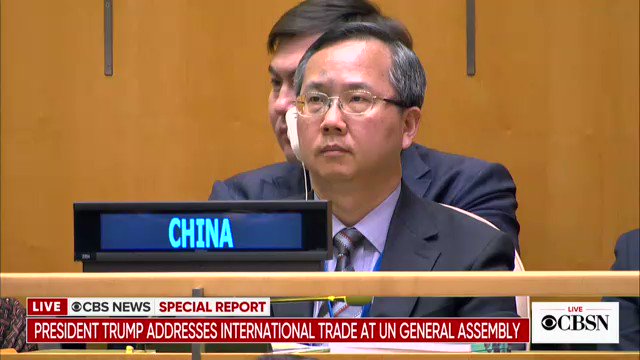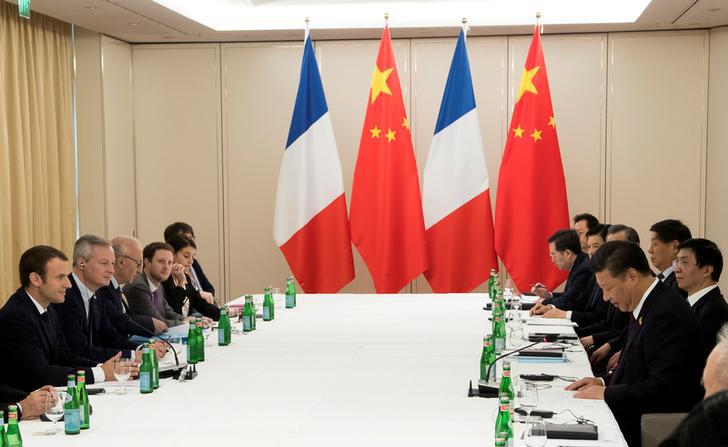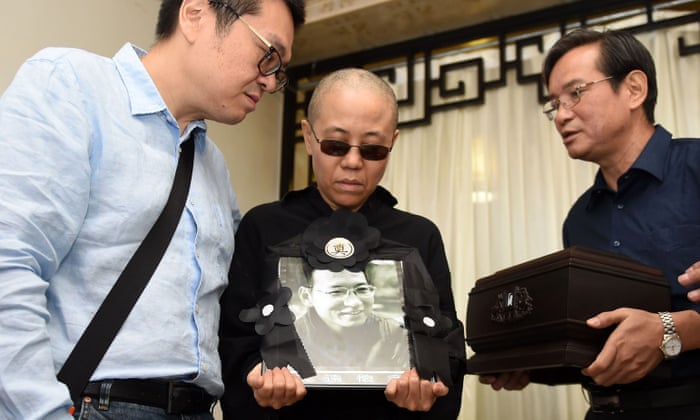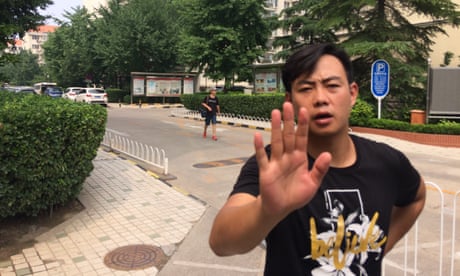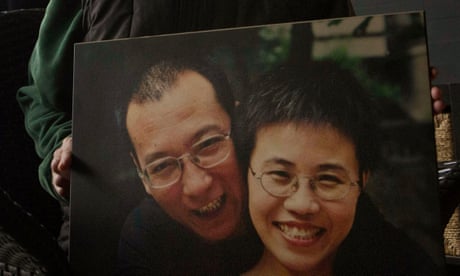By ALEXANDRA STEVENSON
 President Milos Zeman of the Czech Republic, right, and Ye Jianming, left, in Shanghai in September 2015 for the signing of agreements between companies from his country and the Chinese conglomerate CEFC.
President Milos Zeman of the Czech Republic, right, and Ye Jianming, left, in Shanghai in September 2015 for the signing of agreements between companies from his country and the Chinese conglomerate CEFC.
 Patrick Ho
Patrick Ho flew to New York in fall 2014.
His intention, according to the Justice Department, was to bribe
African officials on behalf of a private Chinese conglomerate with global ambitions and enormous wealth.
In meetings at the
United Nations, Ho, a former Hong Kong civil servant, laid the groundwork for millions of dollars of payments to the President
Idriss Déby of
Chad and
Uganda’s foreign minister in exchange for
oil rights in the two countries, federal prosecutors say.
The accusations against Ho, detailed in a
criminal complaint filed in Manhattan, became public this week after officials charged him and
Cheikh Gadio, a former Senegalese official who acted as a fixer for Ho, with
international money laundering and violations of the Foreign Corrupt Practices Act. Gadio was arrested on Friday and Ho on Saturday, the Justice Department said.
The complaint does not name the Chinese company Ho represented, but the specifics of the case make clear the company’s identity:
CEFC China Energy Company.
Details outlined by the Justice Department reveal the innovative tactics the company pursued to secure coveted oil rights in Chad and Uganda through its nonprofit think tank in Hong Kong.
Mr. Ho was an executive at the nonprofit.
CEFC has risen suddenly from a little known Chinese company to a major player in the global energy business, with investments in Europe, the Middle East, Central Asia and Africa.
In September, the Chinese conglomerate took a $9 billion stake in Rosneft, Russia’s state-owned energy giant and a subject of sanctions by the United States.
CEFC has played to China’s geopolitical ambitions.
It is among a small number Chinese companies to receive Beijing’s approval to chase splashy deals at a time when the government has mostly restricted overseas acquisitions.
The investments have largely meshed with China’s strategy to court other countries through infrastructure and energy investment.
Chinese businesses like CEFC are increasingly mixing money with diplomacy as they scour the world to secure valuable natural resources.
The criminal complaint against Ho shows how the practice can be distorted, offering rare insight into a vast, mysterious conglomerate with ties to the Chinese Communist Party.
CEFC provides all of the financing for the China Energy Fund Committee, a Hong Kong research organization.
The conglomerate’s founder, Ye Jianming, is listed as a chairman on the think tank’s website.
Through Ho, the think tank brokered the approaches to officials in Chad and Uganda, prosecutors say. Details included in the complaint about the company and think tank were confirmed by news releases from the CEFC’s website.
In a statement, CEFC disputed the allegations.
It said it was “highly concerned” about the action taken against Ho, a former home affairs secretary in Hong Kong, and added that the think tank did not “get involved in business activities of CEFC.”
CEFC has emerged from obscurity in recent years as a major player in the China’s plans for a modern day Silk Road, scooping up businesses in the oil, travel and financial industries in the Czech Republic, Kazakhstan, Spain and the Middle East.
Along the way, it has grown into a behemoth with revenue of nearly $40 billion in 2015, according to corporate disclosures.
Ye, who was 25 when he started the company, has been both a corporate leader and a diplomatic envoy of sorts, posing for photographs with leaders like President Recep Tayyip Erdogan of Turkey, Jean-Claude Juncker, the president of the European Commission, and President Idriss Déby of Chad.
He has also met with Henry Kissinger, the former secretary of state, and Alan Greenspan, the former Federal Reserve chairman.
His think tank holds special consultative status with the United Nations Economic and Social Council.
According to its website, it has organized conferences “on world civilizations to explore common ethics” that have featured senior American military officials and Chinese People’s Liberation Army generals.
 Cheikh Tidiane Gadio, a former Senegalese official was charged by the Justice Department in bribery scheme along with Patrick Ho, a former Hong Kong civil servant with ties to CEFC.
Cheikh Tidiane Gadio, a former Senegalese official was charged by the Justice Department in bribery scheme along with Patrick Ho, a former Hong Kong civil servant with ties to CEFC.
In China, CEFC has become a prominent corporate player.
Its oil storage facilities in Hainan Province are leased to the state-owned giant ChemChina as part of the country’s strategic reserves.
The company also has joint ventures with the state-backed China State Shipbuilding, China Railway and Guangdong Material Reserve Administration.
The Communist Youth League, which has long bred new generations of party leaders, is listed as a part of the CEFC management that oversees strategy.
CEFC has sought major oil deals outside China, playing a major role in Xi Jinping’s One Belt One Road initiative to bring developing countries on China’s periphery closer to its orbit through infrastructure projects.
In September, CEFC agreed to take the stake in Rosneft.
In October, Chan Chauto, the company’s president, met with President Vladimir V. Putin of Russia at an investment forum in Moscow.
CEFC also has a joint venture with Kazakhstan’s national oil company, KazMunayGas International, which has given it access to a network of oil and gas terminals in Europe.
It was the company’s pursuit of oil rights in Africa that attracted the Justice Department’s attention.
Ho met Gadio, a former foreign minister in Senegal, at the United Nations with a proposition, according to the complaint filed in Manhattan.
CEFC wanted to expand its oil operations into Chad, and to do so with
CNPC, a state-owned Chinese company facing a $1.2 billion fine in Chad for environmental violations.Gadio, who
helped broker a peace agreement that ended the military conflict between Chad and Sudan, helped facilitate a CEFC pledge in early 2015 that it would make a $2 million “donation” to Idriss Déby for charitable causes, according to emails and documents obtained by the Justice Department.
The pledge was intended to influence the government to give CEFC the exclusive rights to certain oil blocks, federal prosecutors say.
In the end, the company acquired other oil rights from a Taiwanese company.
But Chad’s fine against CNPC was ultimately lowered to $400 million, and CEFC is in talks to develop an oil project in the country with CNPC, according to the CEFC website.
Ho is accused of paying Gadio $400,000 for his services.
In a statement, CEFC said its deal with the Taiwanese company was a “financial investment in Chad” that did not involve any other “interest” from the country’s government.
Edward Y. Kim, Ho’s lawyer, declined to comment.
Robert Baum, a lawyer for Gadio, said that his client’s “integrity and honesty have never been questioned.”
Around the time that Ho met with Gadio, he also initiated contact with Uganda’s foreign minister, Sam Kutesa, according to the complaint.
Kutesa had just become president of the United Nations General Assembly, according to the Justice Department.
Over the course of a year, the two struck up a friendship, the complaint says.
By 2015, Kutesa, in his General Assembly role, had appointed Ye as a “special honorary adviser,” officials said.
When Kutesa returned to his position as Uganda’s foreign minister, he solicited a payment from Ho in the form of a donation for a charitable foundation that he planned to launch, according to the Justice Department.
Uganda’s foreign minister Sam Kutesa
The payment was actually in exchange for oil contracts.
Ho wired $500,000 into a bank account designated by Kutesa, who is not charged in the criminal complaint.
The Ugandan Ministry of Foreign Affairs did not respond to a request for comment.
CEFC said it had no investment in Uganda.
Two weeks after the complaint says the money was wired, Kutesa’s wife sent a note to Ho, expressing the couple’s thanks to Ye of CEFC.
“Let me seize this opportunity,” she wrote, “to convey our gratitude to the chairman for his contribution to our foundation.”
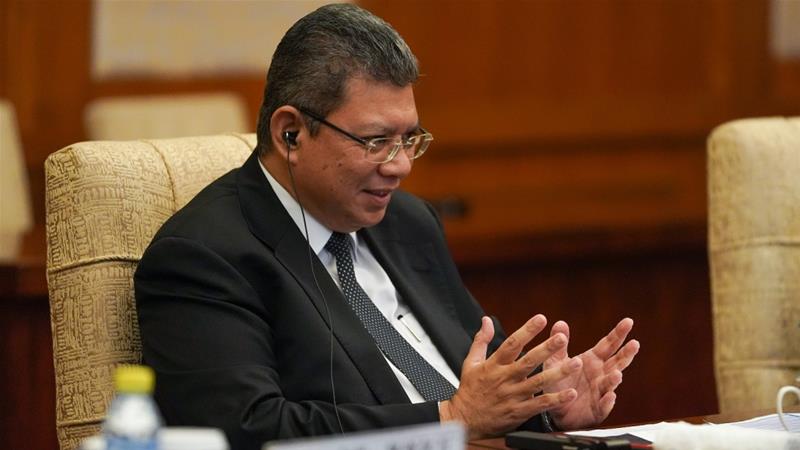 Malaysian Foreign Minister Saifuddin Abdullah said he expects ASEAN to further debate in the coming months the need for a 'Code of Conduct' with China over the South China Sea issue
Malaysian Foreign Minister Saifuddin Abdullah said he expects ASEAN to further debate in the coming months the need for a 'Code of Conduct' with China over the South China Sea issue 


/cdn.vox-cdn.com/uploads/chorus_image/image/65310408/1170743237.jpg.0.jpg) President Donald Trump addresses the United Nations General Assembly on September 24, 2019, in New York City.
President Donald Trump addresses the United Nations General Assembly on September 24, 2019, in New York City. 
